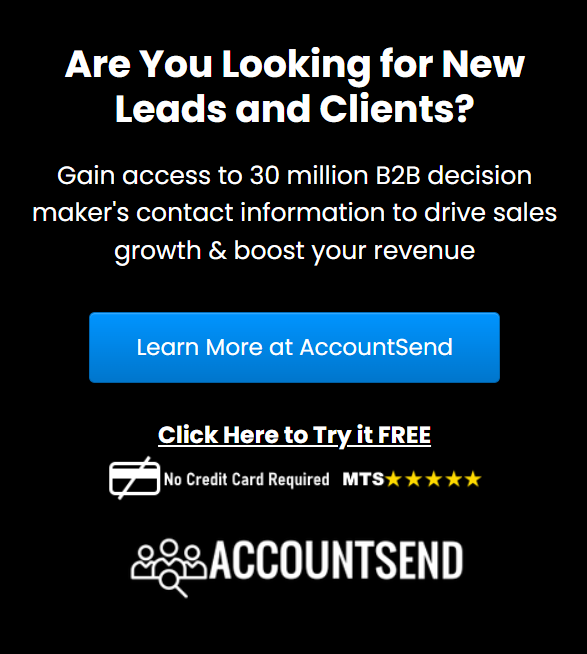The Foundation of Success: Tips for Building a Solid B2B Contact Database
Article by Jonathan Bomser | CEO | AccountSend.com
A robust B2B contact database serves as the bedrock of successful business marketing strategies. It provides valuable insights, fuels lead generation, and is vital for account-based marketing. Here are seven practical tips to help you build a solid B2B contact database for your business.
Start with Data Collection
Building a B2B contact database starts with effective data collection. Collect data from various sources like your website, social media platforms, sales outreach efforts, and industry events. This will help you create a comprehensive and diverse contact database.
Prioritize Data Quality
It's not about the size of the database; it's the quality that counts. Prioritize collecting accurate, relevant, and up-to-date contact data. Ensure the data includes crucial information like names, job titles, company information, email addresses, and phone numbers of decision-makers within target companies.
Leverage B2B Data Providers
Professional B2B data providers can be a valuable resource for building your contact database. They can provide access to extensive, verified leads in your target industries and geographic markets. This can significantly speed up the database building process.
Regularly Update Your Database
A B2B contact database needs regular maintenance to retain its effectiveness. Update the database regularly to reflect changes in job titles, contact information, and company details. This ensures your sales and marketing efforts are based on the most current information.
Segment Your Database
Market segmentation is an essential aspect of managing your contact database. Segmentation allows you to group contacts based on specific criteria like industry, company size, or location. This enables more personalized and effective communication.
Integrate with Your CRM
Integrating your B2B contact database with your Customer Relationship Management (CRM) system is a game-changer. It enables seamless data flow, automates data entry tasks, and provides a unified view of each contact, enhancing your team's efficiency.
Respect Privacy Laws
Ensure your data collection and management practices comply with applicable privacy laws and regulations. This includes getting necessary permissions for data collection and providing transparent communication about how you use and protect the data.
Remember, a solid B2B contact database is a critical tool for your business. It not only fuels your lead generation efforts but also empowers you to develop targeted marketing strategies, enrich customer relationships, and drive sales growth. By following these tips, you can build a solid foundation for your business success.
SALES AND BUSINESS DEVELOPMENT
10 ways to Say goodbye to stagnant sales with these powerful tactics
From Snooze to Sales-palooza: Unleash Your Sales and Lead Generation Superpowers!
Transform your sales game with these insider tips
How can AccountSend.com increase your sales, lead generation and business development efforts?
Accelerate your business growth with these insider secrets
10 ways to grow your business using AccountSend.com B2B decision maker data
Don't miss out on these game-changing sales tactics
Unleashing Your Sales Potential: Exploring Targeted Lead Generation
Navigating Tough Times: 10 Strategies to Boost Sales When The Going Gets Rough
LEAD GENERATION
Crack the Code and Unleash Success: The Ultimate Guide to B2B Lead Generation Success and Magic!
Ignite Your Growth: Unleash the Power of Lead Generation to Skyrocket Your Client Base!
Boost your bottom line with these lead generation strategies
Unleash the Power of Lead Generation: 10 Proven Formulas That Deliver Results
B2B CONTACT DATABASE
How to Build an Effective B2B Contact Database
The Benefits of Using a B2B Contact Database for Sales and Marketing
Effective strategies to gain new clients using database lists from AccountSend.com
How to Measure the Success of Your B2B Contact Database
INDUSTRIES INFORMATION

